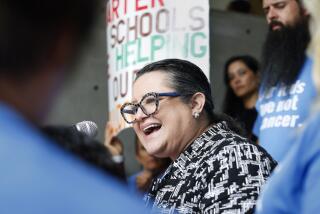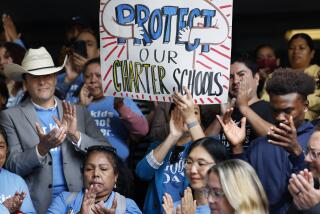Charter schools impress half of California voters
Charter schools have won over about half of California voters, but these independent, non-traditional public schools are not widely viewed as the solution to the state’s education problems, according to a new poll.
Among those surveyed in the USC Dornsife/Los Angeles Times poll, 52% had a favorable opinion about charters; only 12% had an unfavorable impression.
Asked whether charter schools or traditional schools provided a better education, 48% gave superior marks to charters; 24% considered traditional schools more effective.
“As people learn more about what charter schools are, they tend to like the idea of choice,” said USC professor Priscilla Wohlstetter, who directs the university’s Center on Educational Governance.
The charter model appealed to Latino parents in particular. Overall, 52% of parents — those who have a child or grandchild age 18 or under living at home — said they would consider enrolling their children in a charter, compared to 38% who said they would not. Among Latino parents, 56% were in favor and 30% disinclined. More than half the state’s public school students are Latino.
Christopher Gonzales, a construction worker in San Jose, has three nieces in charter schools and a relative who works for one.
“There’s more room for innovation and attacking a problem and thinking about it differently by going outside the traditional established schools,” Gonzales said. “Charter schools can be bad too, but I think they have more potential for a better education.”
Charters serve about 6% of California students, and some respondents said they skipped the charter-school questions because their knowledge of them was limited.
California has more than 900 charters, the most of any state. They are free from many regulations governing traditional public schools and at most of them, teachers and administrators are not unionized, as they are in other public schools.
Many teacher union leaders and other critics have worried that charters siphon public funds, philanthropy and the better students from traditional public schools.
But those fears have not permeated popular opinion, the poll found, especially among many who are familiar with charter schools. They include Jepal Mangum, 40, a Riverside parent who sent two children to a charter.
“I was really happy with the school,” said Mangum, an African American independent voter who said she leans Democratic and supports unions. She liked the small classes and the personal relationship with teachers, two instructors in particular who shaped her children’s “study habits and their outlooks on life. I believe the school really worked.”
Among the largest ethnic groups, African American respondents expressed the most support for charter schools. A number of charters have an overwhelmingly black enrollment, but some critics have expressed concern about charters leading to re-segregation.
Voters overall opposed supporting charters at the expense of resources for traditional schools, said Stanley B. Greenberg, chief executive of Greenberg Quinlan Rosner, a Democratic firm that co-directed the bipartisan poll.
Far more people favored increasing funding for traditional schools over the strategy of creating more charters, by a 64%-21% tally. Nor are voters inclined to hand over low-performing public schools to outside operators, including those that run charters.
Only 32% said schooling would improve if low-performing campuses were assigned to “qualified, licensed, for-profit companies.” The number rises to 37% for nonprofits. Nearly all California charters are organized as nonprofits.
“Most nonprofit organizations that are running schools or have ever run schools have some end game in mind,” said Betsy Hillig, 63, a registered Democrat who lives in Lakewood. “I have not met a nonprofit entity that just wants to teach kids.”
For-profit corporations “are even more horrible. They’re in it for the money,” said Hillig, a retired teacher with two grandchildren in traditional public schools and one in a parochial school.
In California, as elsewhere, charters represented a compromise: Conservative Republicans and some public school critics had previously pushed to let students attend private schools with government-funded vouchers for tuition, but California voters rejected that approach. Charters offered a different kind of choice — namely, public schools that are not run by the local school district.
“There’s acceptance for charter schools,” said Linda DiVall, the chief executive of American Viewpoint, the Republican polling firm that co-directed the survey.
Bill Teller, an 80-year-old registered Republican from north of Lake Tahoe who is married to a retired teacher, offered general support for these schools.
“Charters are a step in the right direction,” he said. But he would go further: “I would disband the current system entirely and put it all on a voucher system.”
The survey, conducted for the USC Dornsife College of Letters, Arts and Sciences and The Los AngelesTimes, questioned 1,500 registered California voters Oct. 30 through Nov. 9. The margin of sampling error is plus or minus 2.52 percentage points.
More to Read
Start your day right
Sign up for Essential California for news, features and recommendations from the L.A. Times and beyond in your inbox six days a week.
You may occasionally receive promotional content from the Los Angeles Times.







